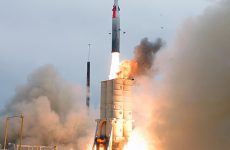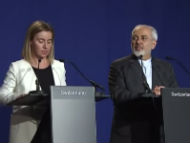
Israel’s military command has sounded the message loud and clear – Iran is bent on a longterm strategy to launch a massive guided-missile attack on the Jewish state. This is the sole conclusion when assessing the most recent public statements by IDF Chief of Staff Aviv Kochavi and today, by Gen. Amikam Dvorkin, the Commander of the IAF. And it will be Dvorkin who will be calling the shots when he orders his fleet of fighter bombers to eliminate this threat to Israel’s very survival.
First, consider the recent immediate actions by Iran, starting with its successful cruise missile and drone attack on Saudi Arabia’s oil refineries in September. This indicated a dramatic surge not only in Tehran’s daring (by tweaking the nose of a close American ally) but also a dramatic step towards guided missile and cruise missile technology (missiles have guidance systems, as opposed to rockets that are fired in the general direction of the target and hoping for the best). This naturally caught Israel’s attention, as did America’s failure to respond. Couple this with Iran’s deployment of such sophisticated weapons to its proxy, the Huthi rebels in Yemen, where they are likely being operated by Iranian personnel.
This, in effect, is closing the ring around the Jewish state. Just look at the map, starting with southern Lebanon where Hezbollah, another Iranian proxy, rules the roost. There, under the noses of the UN observers, Hezbollah has acquired an arsenal of some 100,000 rockets and missiles in and under more than 100 Lebanese villages along the Israel-Lebanon border. In the second Lebanon war of 2006, Hezbollah uncovered this arsenal and started launching rockets at Israel. However, only a few of them were precision-guided, and Israeli aircraft swiftly eliminated the threat – little damage was caused by this attack.
However, the Iranians have learned the lesson. They have developed and are producing more precision-guided missiles capable of landing within five to ten yards of their targets. For some time, the Iranians have been doggedly trying to smuggle these “game-changing” guided missiles through Syrian into southern Lebanon. However, Israeli jets have destroyed many, if not all, of them in transit. In fact, apparently stymied, the Iranians then tried to set up their own guided-missile plant near Beirut. But, again, it was demolished in a mysterious airstrike. But the Ayatollahs in Tehran never take no for an answer. They have also tried to threaten Israel with rockets from neighboring Iraq, but again, they were thwarted.
So now we are informed that they are establishing a rocket base in Yemen, in the far south. It would appear that Iran’s plan is to try and surround Israel with a ring of missile bases that could be ordered to attack the Jewish state simultaneously. In other words, it is similar to an octopus with its tentacles posing multiple threats. Eventually, if they succeed in this strategy, Tehran could order a simultaneous attack on Israel from different directions. One observer describes it as a “swarm offensive” by many missiles from different directions that could vastly outnumber Israel’s limited Iron Dome, David’s Sling, and American-supplied Patriots.
This is the IsraCast conclusion from the most recent statements by the IDF’s high command and from acting Prime Minister Bibi Netanyahu (there is still no new permanent PM following the ongoing political deadlock since last September’s election). We move on from our deduction to Israel’s airforce commander, Gen. Amkam Dvorkin, who is tasked with thwarting Iran’s strategy by utilizing Israel’s considerable air power. By chance, Israel’s number one fighter pilot was addressing a graduating class of cadets serving in the IDF air defense. These were his words:
“The challenge of defending Israel is now more complex. In addition to the conventional missile and rocket threat, Iran is now threatening us with pilotless drones and cruise missiles (DE – cruise missiles are capable of flying in low altitudes and more difficult to intercept). As we speak, Israel’s air defenses stand on guard. The test of our defense will be our soldiers at the other end of this Iranian threat. We are required to train hard and always be on alert. These are the standards of the Israeli Air Force, and I am confident that we will be so in the future. I count on you to overcome every challenge when you are put to the test.”
The airforce commander’s stern warning followed hard on the demand of IDF Chief of Staff Aviv Kochavi for a considerable increase in his defense budget in light of Iran’s expanding role in the region. Previously, Netanyahu disclosed that the precision-guided missiles that Iran has stationed in Yemen or capable of reaching Israel. The bottom line: Iran at present is proving to be an irresistible force from wherever it can in the region. On the other hand, Israel has no choice but to continue to be the immovable object prepared to do whatever it takes.



